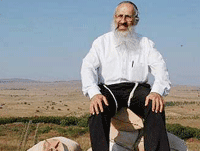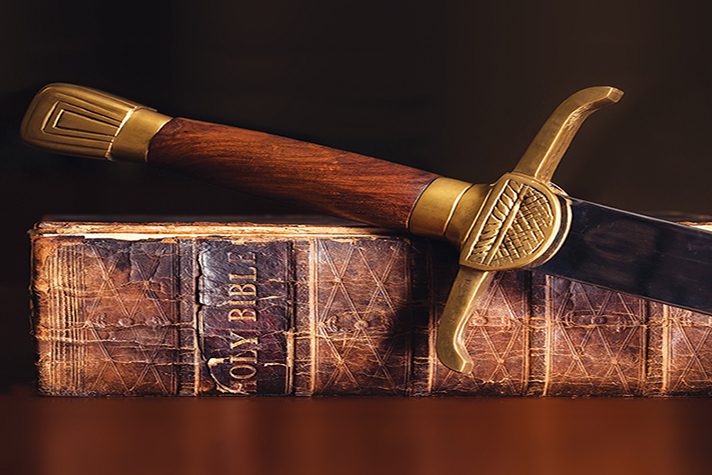The Maccabees Revolt
by HaRav Shlomo Aviner, Head of Yshivat Ateret Yerushalayim

Underground resistance of Yehuda HaMaccabee
How did Yehuda HaMaccabee dare to act without the support of the whole nation? Who appointed him king or authorized him to declare war? R. Avraham Yitzchak Kook raises this question and replies: The fundamental issue for which the Maccabees fought was freedom of religion. The Greeks attempted “to make them forget Your Torah and to transgress the laws You desire them to follow.”⁵ Under such a threat (shemad) we are commanded to die rather than transgress even the smallest commandment. Therefore, isn’t it not only permitted, but an obligation, to fight in order to put an end to this religious persecution and restore freedom of religion?⁶ In other words, the Maccabees’ revolt did not begin as a war, but rather as an underground resistance to persecution, and intensified to the point that they were endangering their lives in order to sanctify God’s name (known in Hebrew as mesirut nefesh al kiddush Hashem). Indeed, we are commanded to sacrifice our lives in order to preserve our freedom to worship God. However, if we can kill our persecutors instead of forfeiting our lives, all the better. We are not obliged to allow ourselves to be killed if we can defend ourselves. Certainly, then, organizing an armed resistance which may deter our enemies from persecuting and killing us in the future is a great mitzvah. This resistance is not considered a full-fledged war, but rather is the individual obligation of each Jew. There is, therefore, no need for a national consensus – although every individual member of Am Yisrael is obligated to act in such a manner.
Armed resistance on Shabbat
This approach provides insight into another issue. In the beginning of the Greek persecution, many Jews fled to caves in the wilderness, and the Greeks would come to attack them on Shabbat. The besieged Jews refused to desecrate Shabbat by counter-attacking the Greeks or even by blocking off the entrances to their caves. They, their wives and children were killed. When Matityahu and his group heard this, they grieved and said, “If we continue this trend…we will all be wiped out… . If our enemies come to fight us on Shabbat, we shall fight back and defend ourselves. We will not allow them to kill us as they did our brothers in the caves.”⁷ This passage is puzzling: Didn’t the Jews in the caves know that saving a life takes precedence over Shabbat observance, thereby permitting one to fight on Shabbat? It’s hard to believe that this halacha was originated by Matityahu HaChashmonai. Did all previous wars in Eretz Yisrael – during the days of Yehoshua, King David, and so on – end every Friday before sundown? In the case of these Jews, we may deduce that they did not view their underground learning of Torah as a form of resistance against the Greeks. Rather, they were risking their lives in order to observe the Torah. It was for the purpose of keeping the mitzvot that they had fled to the wilderness.⁸ It was for this reason that they refused to fight on Shabbat. They viewed the Greek attacks on Shabbat as part of their general attempt to coerce the Jews into transgressing the Torah. Thus, they chose to die rather than desecrate the Shabbat.⁹ In response, Matityahu and his group initiated a new principle: The fight to preserve the Torah and mitzvot would from now on no longer be passive, because this line of action would lead to the extermination of Am Yisrael. Instead, they would actively resist, through warfare, the Greeks’ oppressive laws against them. The Maccabees saw combat as a legitimate and effective method of preventing Greek religious persecution. They were committed to active resistance, which could very well entail fighting on Shabbat. Engaging in war on Shabbat is permitted according to Halacha; one is even obligated to desecrate Shabbat in order to save a Jewish soul.¹⁰
Was the Maccabees’ war mandatory? Here is another puzzling fact: Yehuda HaMaccabee exempted from his “army” all the categories of people that are exempted by the Torah.¹¹ However, the exemptions in Devarim refer to a voluntary war, whereas in a mandatory war, our Sages tell us that “everyone goes to war, even a bridegroom… .”¹² Wasn’t the Maccabees’ war a mandatory one, stemming firstly from the obligation of saving Am Yisrael from foreign oppression (i.e., of rescuing Jews from death) and secondly from the obligation of conquering the Land (i.e., redeeming Eretz Yisrael from Greek rule and establishing Jewish sovereignty)? If the Maccabees’ war was mandatory, how, then, could he have released any soldiers? The explanation is that in the first stages of the revolt, it was not a halachically recognized war. Such a war can only be declared by the whole nation, represented by the king or some other head of state. Eretz Yisrael was, at the time, subservient to the Seleucid rulers and had no national institutions of its own from which to receive approval for the uprising. Yehuda HaMaccabee had not been chosen or appointed to represent the nation and therefore had no authority to declare war. The armed opposition was his own personal initiative. He was certain that this was the correct course of action and the one which would lead to the physical and spiritual salvation of Am Yisrael. However, he also knew that, at least at first, he did not have the support of the majority. He could not act in the name of Am Yisrael and could not exercise the authority of a ruler to declare war. Subsequently, as a result of the Maccabees’ repeated victories in battle, they gradually won over the people until they were unanimously accepted as national leaders and kings.¹³ Therefore, although his armed resistance was indeed a mitzvah, it was not considered a war since he did not represent the nation, and he could not recruit those who are required to fight only in a mandatory war. For the same reason, Yehuda HaMaccabee didn’t conscript soldiers; he depended solely on volunteers for his “army.” Only later, when the nation as a whole came to support the Maccabees, did the Hasmoneans exercise the authority of rulers.
Was the miracle of the oil necessary?
The oil that miraculously burned for eight days arouses many questions. What need was there for a miracle at all? According to Halacha, if there is no pure oil available, one is permitted to use impure oil. Furthermore, after so many years of the menorah not having been lit, couldn’t they simply have waited a few more days to light it with pure oil? In any case, what is there about this particular miracle that makes it worthy of its own holiday? Many miracles have been recorded in Jewish history, and most of them do not warrant setting aside a special holiday. Maharal of Prague explains that the seemingly insignificant miracle of the flask of oil was a sign from God to those who were doubtful that He endorsed the Maccabees. The miracle served to publicize to all that the Maccabees’ war against the Greeks was in line with God’s will, and that, from beginning to miraculous end, the whole process was a result of Divine providence and direction: “And therefore the candles burned miraculously, in order for all to know that God had performed miracles throughout, and that the [Maccabees’] victory in war was effected by the Holy One.”¹⁴ According to some commentators, the first of the eight days of Chanukah is celebrated in honor of the military victory and the actual discovery of the flask of pure oil, and the other seven days in honor of the miracle of the oil burning continuously.¹⁵ The other opinions hold that no special day was set aside to commemorate the victory. Their rationalization is that the miracle of the oil itself is none other than an affirmation of the miraculous nature of the military victory, as we have said above.
A clear, Divine stamp of approval
The fact that we can analyze the logistics and military strategy of every battle does not contradict the idea of Divine intervention. After hundreds of years of dependence and restrictions, it is miraculous that the Maccabees had the wisdom and courage to fight as they did.¹⁶ This is a subtle, concealed miracle, however, which leaves people free to claim that the victory in war was natural. Therefore, God caused the oil to burn miraculously for eight days, in order to give a clear Divine stamp of approval to the whole physical and spiritual struggle. It was only at the end, after the Maccabees had fought and won, that everyone realized that God was with them and that they were accepted as national leaders.¹⁷ Although the Torah teaches us that a king must be “chosen by the Lord your God,”¹⁸ this need not necessarily be through the words of a prophet. Unqualified success in redeeming Am Yisrael is in itself a clear sign from God that a leader has been chosen. The Hasmonean kings were appointed by the Sanhedrin rather than by a prophet, since prophecy had ceased in their generation. Gradually, through their devotion to God and their remarkable achievements, the Maccabees won the hearts of Am Yisrael and attained positions of leadership, one after another. First Yehuda HaMaccabee led the nation, then Yonatan, then Shimon – at which point he was officially given the title “Nassi,” and the Hasmonean family were established as rulers.






